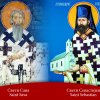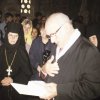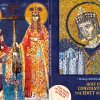In October of 2019, the parish celebrated its 125th anniversary together with the guests from Herceg Novi. One of the results of this grace-filled event and brotherly gathering was a spontaneously-proposed idea to establish a sister-city relationship between Herceg Novi and Jackson. It had no political motivation or connotation, but it was felt rather as a civilizational, cultural and historical act and fruit of love and prayers of the great man of God who with his wide-spread arms embraced these two beautiful cities on the two sides of the planet.
Only a few weeks later, the Jackson City Council proclaimed their letter of intent, which was given to our guest priest from Sasovići and Herceg Novi, who came to Jackson to celebrate with us Saint Sebastian Day at the end of November.
The return letter of intent recently came from Herceg Novi and was accepted by the Jackson City Council on Monday evening, February 24.
So, from today and on, Herceg Novi, Bay of Kotor, Montenegro, and Jackson, California, USA, are Sister Cities!
The representatives of the parish and the city of Jackson are planning to visit their Sister City of Herceg Novi in June this year.










